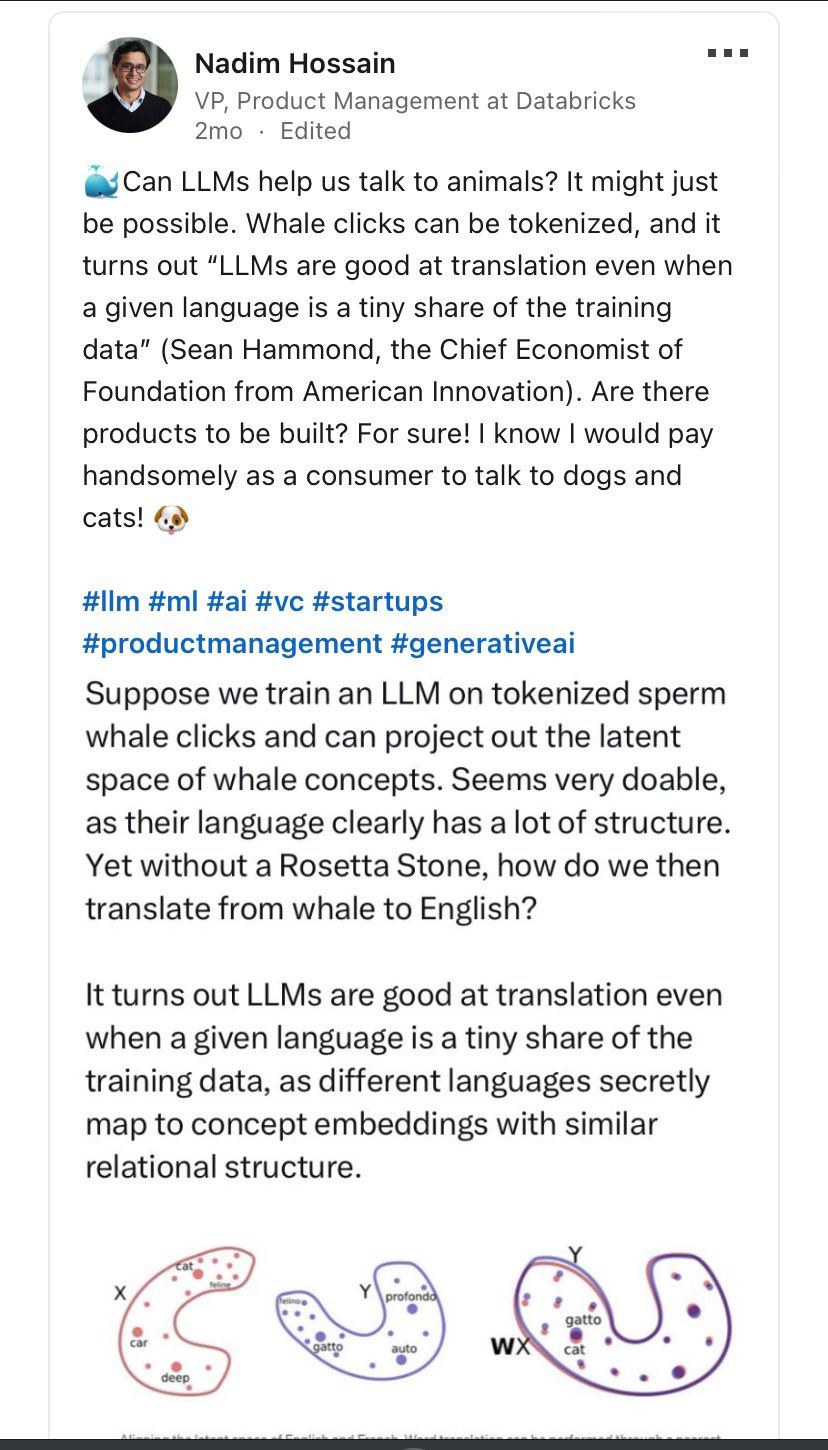

I saw the post above and found it very interesting. It would be awesome if we can talk with Animals in some way in the next years. I will be the judge to whether what exists in 2035 qualifies as being able to talk with Animals.
People are also trading
I feel like this question is, in fact, more about the intelligence of animals rather than our ability to decode their means of communication. There was a chimp named Nim Chimpsky who was taught sign language, and somewhat famously the longest sequence of signes he produced was "give orange me give eat orange me eat orange give me eat orange give me you" (https://en.wikipedia.org/wiki/Nim_Chimpsky). It surely communicates some information, but it doesn't feel much different from a dog staring into its bowl or barking when it hears the word "walk". I'm very skeptical that when we understand how whale sounds map to concepts those concepts will turn out to be complex enough for a "talk" to take place. And anyways, it should be described in more detail what counts as a "talk" for the market to resolve unambiguously.
Or take birds, for example. We understand the meaning of a bird song perfectly well: it marks the territory of a singing male and advertises him to females. If I go to a park and play a firecrest* song, and an angry male firecrest comes down from a tree to kick my ass because it thinks that that's a competing male in its territory, does that count as a "talk"? I would say no, and I would also bet that we are unlikely to get a much more meaningful conversation with an animal.
*I chose the firecrest as an example because I've tried it and it works particularly well with this bird, they do come down from a tree and start aggressively singing and flying around you.

@StepanBakhmarin I believe the core concept here is grammar. The chimpanzee was utterly unable to comprehend grammar. Just trying to match what you're trying to say to a term
@StepanBakhmarin I think this comment probably demonstrates a not totally current view on the state of animal communication in the wild. If you're interested in reading more, you should read about compositional syntax in the great tit (parus minor) or other new work by Toshitaka Suzuki (and some others).
My point isn't to say this market is a given, but I think you misunderstand two critical points: 1) we not understand birdsong 'perfectly' 2) The chimpanzee experiments don't really demonstrate that they're unable to understand grammar, but there could be an intelligence gap that prevents them from synthesizing a new grammar/syntax.
In my (current view), the most likely path to YES resolution is machine learning helps us discern very subtle nuances to a species' language we've overlooked or had insufficient data for, and make a breakthrough in our understand of their syntax, and we build some type of translator of sorts.
Not teach another species to use a human created language.
@No_uh thanks for pointing me to the new evidence, it's fascinating!
So I've read this study (https://www.nature.com/articles/ncomms10986), which I believe is the one you referred to (compositional syntax), and this brief report (https://www.u-tokyo.ac.jp/focus/en/press/z0508_00339.html). To summarize the first one here as shortly as possible for other people who will read the discussion:
The two calls of the Japanese tit we care about are ABC and D. The ABC call means "look around", the D call means "come here". The tits sometimes use them in quick succession, forming the ABC-D call. If you play the ABC-D call, the bird you play it to will both look around and approach the sound source, but if you artificially change the call to D-ABC, the bird will rarely approach and won't look around. This means ABC-D is a meaningful unit and not just two different calls. "Here we provide, to our knowledge, the first unambiguous experimental evidence for compositional syntax in a non-human vocal system".
(Also the fact that I can hear great tits through my window right now and can immediately apply my new knowledge to understand them made reading the paper even more fun.)
Since I'm an unpleasant person to talk with, I'll point out that the study is about calls, and I was talking about a song, in a specific sense "a territorial behavior of most passerine birds". I know that birds can use calls to warn others about a predator, or to stay in a flock, etc. I also never claimed that we know the meaning of literally every sound every bird can make, so if you wanted to tell me that we are still discovering new stuff about how birds communicate, I totally agree, and that was a really interesting example. But I think my point about birdsong stands--that we do understand the meaning of that specific behavior, and that this understanding does not allow us to have a "talk" with a bird because the meaning is too primitive. And if we take this new study into account, it still stands, because the fact that birds can say not just "come here" but "come here and look around while you're at it" is good for them I guess... but not the quality of conversation I strive for?
And about that: after thinking about it for a minute, I'd say that "talk" isn't about having grammar or not, but about having meaningful back-and-forth, a non-trivial two-sided flow of information. There must be a number of ways to respond to the initiation of a "talk", but if your whole vocabulary consists only of calls (sorry) for action like "come here", "check me out" or even "give me [_]", that's not possible. And if I recall things correctly, that was the case with ape sign language studies, but I don't have a clear picture of them and might be wrong.
I'd say that the crux here is that you think it's quite probable (>= 59% since you are holding YES shares) that there is some syntax complex enough to have that, and we have overlooked the subtleties and so don't know about it, and I think it is less probable, and ML will surely allow us to discover more stuff like the ABC-D call, or something slightly more complex, but not qualitatively different and complex enough. From my point of view, my prediction seems... simpler?
Also, I don't understand what you mean by your second point:
> The chimpanzee experiments don't really demonstrate that they're unable to understand grammar, but there could be an intelligence gap that prevents them from synthesizing a new grammar/syntax.
Synthesizing a new grammar? Like they understood the ASL grammar, but weren't smart enough to come up with a new one? Hell, I usually don't come up with new English grammar, and if I did everybody would say that I don't know English and look at me like I'm an idiot, so I guess there is an intelligence gap between me and the level you consider conversation-worthy... Or do you mean that they can understand grammar of a human language when presented with one, but can't make their own chimp language with grammar? But wouldn't that undermine your other point about animals being able to have one, because if not chimps, then who? I'm confused here.
@StepanBakhmarin P.S. I remembered hearing somewhere that the people who taught Chimpsky (or maybe Koko or some other ape, I forgot) sign language didn't know it properly themselves, so probably him not understanding the grammar was a result of poor teachers instead of poor ability. I don't know if it's true; just conveying that such point of view exists somewhere out there.
@StepanBakhmarin It's fair to make a distinction between calls and songs I guess for being cheeky lol, but the border between them is undefined and pretty arbitrary. Whether a vocalization is long enough to cross the threshold is not set in stone, nor the complexity required. Even some species which use 'songs' for purpose X may be found while other species use 'calls' for purpose X. My experience with ornithology leads me to believe it was something defined quite long ago for mant species and there's little reason to change them since the boundaries are arbitrary.
Anyway, yes as far as the meaning of songs go I guess you are right. We know the function/purpose of nearly every or every bird species yet discovered. You are right. What I meant was, there are probably syntax aspects to songs in some birds, or other subtle features we've not yet realized too. Intentional syllable length, volume differences, etc. that could have subtle differences in meaning (which are things recorded in other orders of non-human animals).
My point about showing the example in the japanese great tit was that it displays compositional syntax, a key grammatical feature. its easier to dismiss that non-human animals lack capacity for a grammar in their communication when there is no evidence for any of its use in the wild. but this is a clear use, and leaves the possibility for aspects of gammar existing in this species at the least!
As for what defines 'talk' i really don't care much or feel the need to discuss it lol. The purpose of my comment was not to convince you that this market would resolve yes (or that buying at 55% or whatever was good EV), just that I thought you may have been just a couple years behind on some animal linguistics insights in recent research.
as for the chimps, yeah, that's not what I was saying. To be more clear, I believe it's possible chimps possess the ability to learn their own communication and grammar (or what aspects of grammar exist in their system) in their development but don't posess the neuroplasticity to learn new systems (especially maybe one as rich as ours) in their older age. Or maybe it's just a matter of breadth of complexity. A conlang with intentionally less complexity could be better? idk I hope that explains better.
Btw, since you enjoyed that paper, here's the newest one I know of (a real hot one right now!), from the brilliant Melissa Berthet (among others), this time showing nontrivial(!!) compositionality in wild bonobos!
@No_uh by paragraphs:
> ok fair, agree
> agree
> agree; revoke my agreement with @Tumbles' statement that animals don't have grammar
> Oh well, I'd say my main point was that the market needs a clear definition, and the thing I was all snarky about was that "talk" part, so if you don't have a position here of which you want to persuade me or anybody else, and that's not what we are discussing at all, I guess we are all good. About me being a couple years behind--surely I am, I'd say I was never up to date in the first place 😭. Now a little less, thanks to you.
> Ok I get it now; sounds plausible to me, might be
> Great, will read, thanks
That was a cool exchange!
https://manifold.markets/keltan/will-ai-allow-us-to-talk-to-animals seems to be some mispricing between these two. ive already shifted it some, but maybe others have space to as well.